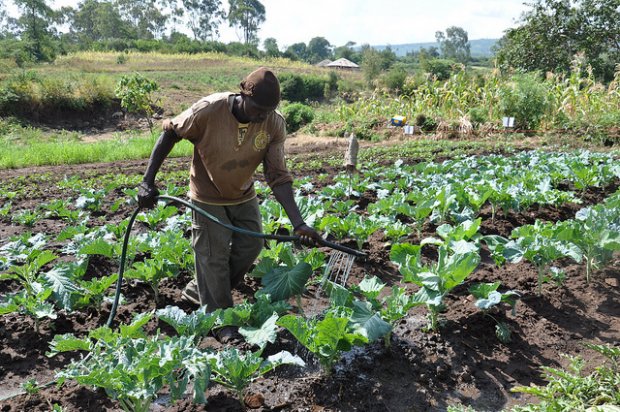 Farmer irrigating his kales in lower Nyando, wetern Kenya. Experts argue that financial institutions have not embraced the sector due to the perceived risks involved. Photo: V. Atakos (CCAFS EA).
Farmer irrigating his kales in lower Nyando, wetern Kenya. Experts argue that financial institutions have not embraced the sector due to the perceived risks involved. Photo: V. Atakos (CCAFS EA).
Efforts by global communities to bring in more financial institutions to support agriculture in Kenya and in the region has gained momentum as experts argues that agricultural sector contributes significantly to many economies but in Africa, financial institutions have not embraced the sector due to the perceived risks involved.
The Global communities have rolled out agribusiness investment for market stimulation programme in three African countries that aims at bolstering trade by the agribusiness small and medium enterprises as an initiative to help financial institutions understand the sector.
The program seeks to not only help banks provide better agricultural finance services but build capacity of the agribusiness small and medium enterprises to access financing.
“Agriculture in Africa comprises a nominal percentage of banking loan portfolio compared to its share of GDP, due to the perceived risks of agribusiness finance and limited understanding in the banking sector, most banks do not have dedicated agriculture departments and loans officers,” notes AIMS Chief of Party Kimberly Tilock.
“This has constrained investment by farmers and agribusiness. It demonstrates that the barrier to lending is not lack of liquidity in banking sectors, but a lack of willingness to expand lending to agriculture.”
RELATED ARTICLE: European Union to fund over 15,000 coast farmers to grow cashew nuts and sesame (simsim)
In 2015 Global Communities rolled out the Agribusiness Investment for Market Stimulation (AIMS) program in Kenya, Tanzania, and Malawi to bolster trade by agribusiness small and medium enterprises (A-SMEs).
The United States Department of Agriculture (USDA) funded program seeks to not only help banks provide better agricultural finance services but build capacity of the agribusiness small and medium enterprises to access financing.
AIMS is expanding trade in key commodities including livestock, horticulture grains, and beans value chains by increasing access to bank financing and markets for agribusiness small- and medium- enterprises.
The Executive Certificate in Agricultural Finance (ECAF) course developed jointly by Global Communities, Financial Access East Africa and Kenya School of Monetary Studies (KSMS) has so far attracted 360 participants from the financial sector in Kenya, Tanzania and Malawi who have since gone through capacity building initiative.
RELATED ARTICLE: Fund targets climate mitigation innovators
“ECAF seeks to build the capacity of loan officers, credit analysts, sector heads and other loan underwriting staff to understand the particular risks and dynamics of agribusiness finance,” said AIMS Chief of Party Kimberly Tilock.
Over time, there has been a significant rising interest in ECAF. This indicates that the program is changing attitudes of banks and their employees on agriculture lending.
“Participants view ECAF as a way to develop their skills for upward growth,” said KSMS Academic Coordinator Dr. Phares Ochola.
President Bankers Association of Malawi Benadette Mandoloma said financial access hurdles are due to lack of technical understanding and training on transaction dynamics across value chains to bankers.
“Seasonality of agriculture lending determines the agricultural production cycle and unreliable markets at a time when the sector is grappling with the effects of climate change,” she said.
RELATED ARTICLE: Africa’s premier water fund to fight soil erosion
Tanzania Bankers Association Executive Director Pascal Kamuzora said women farmers need support as they make up the majority within the subsistence farming setup and motivate the next generation of farmers.
“Women farmers motivate the youth who may feel farming and agriculture is not a desirable or lucrative career path. Financial products should be designed to tap these segments and enable them to succeed,” he said.
The agribusiness capacity building courses are rapidly expanding. KSMS and African Rural and Agriculture Credit Association are in the process of translating ECAF and EDAF to French and rolling out the courses in French-speaking West Africa.
KSMS is exploring opportunities with Agricultural Business Initiative Trust in Uganda and Financial Sector Deepening Rwanda to deliver ECAF training, and Nairobi-based KSMS is holding discussions with Bank of Tanzania Training Institute and Malawi Banker’s Association on possible collaborations to facilitate future ECAF trainings in the two countries.
RELATED ARTICLE: USAID funds automated air drier to boost factory’s processing capacity
Also, KSMS is developing an online version of ECAF and has contracted mElimu, an e-learning platform service provider, to extend reach of ECAF to a wider audience.
Dr Ochola says banks also see it as an investment opportunity, especially those seeking to tap into agriculture sector, by starting to see the return on their investment through better lending practices and quality loan packages.
















Comments powered by CComment